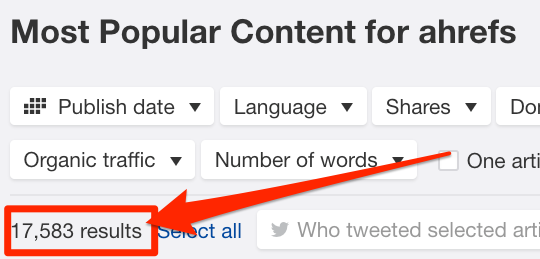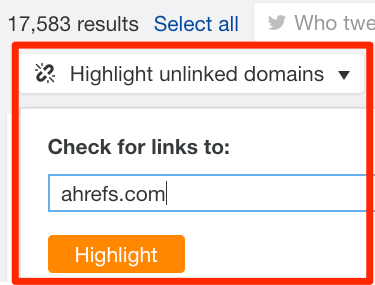Links remain one of the most important Google ranking factors.
Earlier this year, Ahrefs studied almost 1 billion webpages and found a clear correlation between the number of referring domains to a webpage and the amount of organic search traffic it received – a finding that likely comes as no surprise to any experienced SEO.
On November 14, I moderated a sponsored SEJ ThinkTank webinar presented by Joshua Hardwick, Head of Content at Ahrefs.
Hardwick shared actionable tips on how to efficiently execute three proven link building strategies and earn more awesome links for your business.
Here’s a recap of the webinar presentation.

There are plenty of ways to approach link building. If you’re looking to gain better SEO results, you should identify which tactics work best for your business.
Some of the most popular link building tactics include:
SEO practitioners approach these three tried and tested strategies differently. Executing them quickly and efficiently can help you get ahead of your competition.
1. Guest Blogging
Writing a “guest” article for another website is among the widely used link building strategies around.
Depending on the website’s guidelines, you may be able to earn links through your author bio or, sometimes, on the content you’re contributing.
The process looks simple:
- Find a list of sites you might want to guest post for.
- Come up with some topics for posts.
- Reach out and “pitch” your ideas.
- Write your post, get published.
Find Sites to Guest Post For
This step alone can be challenging. What’s the problem?
- It’s time-consuming (scraping, merging, etc.).
- Everyone is reaching out to these same sites.
- They’re inundated with requests (and sick of them).
- Sites are often low-quality and spammy.
These issues can be fixed, though.
- DON’T chase websites that explicitly state they accept guest posts. These sites are often inundated with pitches. They also tend to get lenient and accept low-quality guest posts every now and then.
- DO reach out to sites that talk about relevant topics. It doesn’t really matter whether they have a Write for Us page or not. Most websites care about the audience and if you offer them a guest post that is relevant and high-quality, they might consider accepting it.
One of the easiest ways to find websites to guest post for is by using Ahrefs’ Context Explorer Tool.

You may search over 1 BILLION webpages for mentions of any word/phrase and filter them according to language, Domain Rating, etc.

Come up with Guest Post Ideas
There are three techniques that can help you generate plenty of guest post ideas:
- The Robin Hood Technique: Take ideas from the rich. Give to the poor. Simply put, you are to take inspiration from a popular article on a big website.
- The Splintering Technique: ‘Splinter’ the big article into subtopics.
- The Perspective Technique: Create multiple versions of the same post (with different perspectives).
You can learn more about these tactics in Top Guest Blogging Tactics for Scalable Link Building Success.
Pitch Your Ideas
Here are two ways you can approach this:
- Pitch more blogs than you can handle: Reach out to 5x-10x more blogs than you can possibly write guest posts for. Not everyone will respond, and it’s always better to have too many opportunities than too few.
- Pitch the same topic to many sites: Offer the same guest post to many websites. This saves you coming up with tons of topic ideas. Give your post to the site that responds first (or the best one). If two or more sites respond to the same pitch, offer one of the sites another topic.
Write Your Post & Get Published
This is the easy part. The blogger has said ‘yes’ to your topic. Now you just need to write it.
But there are some potential issues you might encounter and should be aware of:
- Bloggers stripping contextual links from your post.
- Delayed publishing.
- Non-responses.
2. Broken Link Building
Broken link building is another commonly used tactic. It entails:
- Finding a broken (i.e., dead) link.
- Recreating the dead content.
- Telling anyone linking to the dead resource to instead link to the live version you created.
So how do you find relevant broken links in the first place?
Look for Dead Pages on Competing Sites
Using Ahrefs’ Site Explorer, you can quickly find these link opportunities.
- Paste a competing site into Ahrefs’ Site Explorer.

- Go to the Best by links report.
- Filter for “404 not found” pages.
- You’ll then see all potential broken link building opportunities.
Some sites will give you a goldmine of opportunities. If you find a promising opportunity, view it on archive.org (i.e., the Wayback Machine).
Rinse and repeat this process for as many competitors as you like.
Look for Dead Broken Outlinks on Competing Sites
Here are the steps:
- Go to the Broken links report. This will show you all the broken pages the site is linking to.
- Export this report.
- Go to Ahrefs Batch Analysis Tool and paste the URLs from your Broken links report. Remember to choose the URL option.
- Click analyze.
- The report will show you the broken link building opportunities for the URLs you pasted.
3. Convert Unlinked Mentions to Links
There is also a huge opportunity in converting unlinked brand mentions to links.
To do this:
- Find unlinked mentions.
- Reach out and kindly ask the site owner to “make the BRANDNAME clickable” (i.e., link to your site).
But how do you find unlinked mentions in the first place? There are two ways:
Use Ahrefs’ Content Explorer
- Search for your brand name on Ahrefs’s Content Explorer.

- To find out which of the pages actually contain unlinked mentions, use the “highlight unlinked domains” feature.

- Now, pages from domains that have never linked to us will be highlighted.

- To see only the best results, it’s worth adding a few filters (i.e., language, Domain Rating, organic traffic). You can then export only the unlinked pages.
All that’s left to do now is:
- Work your way through the pages in the exported spreadsheet.
- Pursue any worthwhile opportunities by kindly asking the site owners to “make the BRANDNAME clickable” (i.e., link to your site).
Look for Links to Domain Misspellings
There are times when bloggers mention your brand, link back to your website but misspells your domain (i.e., linking to points to aherfs.com instead of ahrefs.com). It’s technically an unlinked mention.
To find such mistakes:
- Enter a misspelling of your domain into Ahrefs Site Explorer and look for links.

- However, doing this for all possible misspellings can be time-consuming. You can speed things up using a Domain Typo Generator.
- Paste your list of misspelled domain names into the Ahrefs Batch Analysis Tool. Click on Domain as the Target mode.
- For any domains that have links, check the Backlinks report for any links intended for your site.
Keep in mind that not all of these links will fit the bill.
Additional Takeaways
Here are more link building insights from Hardwick:
Third-Party Metrics Don’t Really Matter When Doing Outreach
It’s more important that the site and page from which you’re pursuing a link is relevant. If you’re going to use any metric, look at traffic instead. This is shown in Ahrefs’ Site Explorer.
Linking Farms Are Bad for Your SEO
Google doesn’t take kindly to that kind of thing. Using link farms and private blog networks (PBNs) are risky. Neither tactic is recommended.
Using Google vs. Ahrefs’ Content Explorer to Find Topic Ideas
The main benefit of Content Explorer is that you have one-click exports. Whereas you have to scrape Google to ‘export’ the data – that can be challenging, especially at scale.
Content Explorer also has inbuilt filters that let you refine the results by things like organic traffic, DR, number of referring domains, language, and so forth. You can’t do that stuff in Google.
Improving Your Chances to Earn Links
Connecting with someone in multiple ways before asking to submit a post or get a link won’t necessarily improve your chances to earn links.
Are you connecting in genuine ways (e.g., helping them with something, leaving a genuinely useful or thoughtful comment on their blog, etc.) or just mindlessly adding them on LinkedIn, Facebook, Twitter, Pinterest, etc.?
The former probably helps. The latter won’t.
But then again, every industry is different. It’s something you would have to test to get a definitive answer.
Make Sure the Site You Are Pitching to Is Updated
Ensure that the website you are looking to guest post for is regularly updated.
If there’s been no activity for six years, then they probably don’t care enough to even read your email, let alone add a link to their site.
[Video Recap] 3 Simple Ways to Build Awesome Links for Your Business
Check out the video recap of the webinar presentation and Q&A session below.
Or view the presentation deck.
Image Credits
All screenshots taken by author, November 2018
Join Us For Our Next Webinar!
The State of AEO & GEO in 2026: Forecast, Investments, & Strategies
In this webinar, Conductor’s Pat Reinhart, VP of Services & Thought Leadership, and Lindsay Boyajian Hagan, VP of Marketing, provide exclusive insights and commentary from The State of AEO/GEO in 2026 Report.


